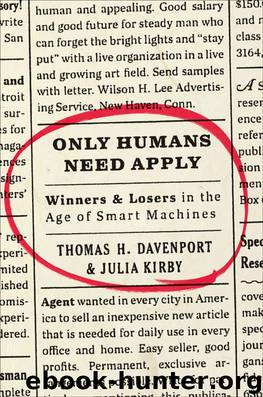Only Humans Need Apply: Winners and Losers in the Age of Smart Machines by Thomas H. Davenport & Julia Kirby

Author:Thomas H. Davenport & Julia Kirby [Davenport, Thomas H.]
Language: eng
Format: epub
Publisher: HarperCollins
Published: 2016-05-23T22:00:00+00:00
Were You Born to Step In?
Some people seem born to step in; others have to make a conscious change in career direction. If you were born to the role, you’ve probably been working with some form of IT for a long time. You may have been interested in technology while in school, and perhaps gravitated toward a career of working with it. When automation technologies came along, you were already there, ready to step in and help your organization deal with it.
Ralph Losey is one of those people. He’s a senior partner at Jackson Lewis P.C., a large national labor and employment law firm. Losey became a lawyer in 1980, when computerized legal research was just beginning. He immediately gravitated toward it—he’d been a computer hobbyist and gamer for several years before he completed law school—and could help his case teams find any law or document it needed. He became a commercial litigator, but he always dabbled in computerized legal research.
The automation technology “e-discovery”—remember, it automatically sorts through millions of documents to determine which ones are relevant to a legal case—came along at about the turn of the twenty-first century. Losey was ready, of course. He began to specialize in it, and eventually abandoned commercial litigation for a full-time e-discovery focus as a senior litigator. He helps both clients and other lawyers plan and interpret results from e-discovery projects, which are primarily used to determine what documents should be read or turned over to the other side in a case. He goes well beyond that, however, developing case strategies based on e-discovery outcomes. In addition to serving clients and his firm on these topics, he also writes a blog,6 has taught e-discovery at a law school (where such courses are still relatively rare), and is widely viewed as a leader in the e-discovery field. We’re sure that whatever other automation technologies come along in the legal field, Losey will be on top of them at an early stage.
The other alternative—a career transformation toward automation technologies—is represented in the same e-discovery field by Alex Hafez. Hafez is still early in his career, but he’s become well ensconced as an e-discovery senior practitioner. Hafez told us that he was also always a bit of a “gadgethead” and employed a lot of technology in his personal life. But he didn’t apply technology to his legal career early on. He attended what he calls a “second tier” law school, and didn’t study e-discovery there. But he quickly got a job as an intellectual property lawyer at a mainstream firm on the highly paid partnership track. Unfortunately his career in “big law” was derailed by the financial crisis, and he was laid off from the law firm.
What to do next? Hafez took a commonly used legal career strategy, going into “contract document review.” This is when humans look through lots of documents (emails, memos, and so forth), most of them scanned into computers, to determine whether they are relevant to a case. It’s labor intensive,
Download
This site does not store any files on its server. We only index and link to content provided by other sites. Please contact the content providers to delete copyright contents if any and email us, we'll remove relevant links or contents immediately.
| Computer Vision & Pattern Recognition | Expert Systems |
| Intelligence & Semantics | Machine Theory |
| Natural Language Processing | Neural Networks |
Algorithms of the Intelligent Web by Haralambos Marmanis;Dmitry Babenko(18248)
Jquery UI in Action : Master the concepts Of Jquery UI: A Step By Step Approach by ANMOL GOYAL(10435)
Test-Driven Development with Java by Alan Mellor(7760)
Data Augmentation with Python by Duc Haba(7629)
Principles of Data Fabric by Sonia Mezzetta(7403)
Learn Blender Simulations the Right Way by Stephen Pearson(7312)
Microservices with Spring Boot 3 and Spring Cloud by Magnus Larsson(7157)
Hadoop in Practice by Alex Holmes(6739)
RPA Solution Architect's Handbook by Sachin Sahgal(6534)
The Infinite Retina by Robert Scoble Irena Cronin(6241)
Big Data Analysis with Python by Ivan Marin(5960)
Life 3.0: Being Human in the Age of Artificial Intelligence by Tegmark Max(5549)
Pretrain Vision and Large Language Models in Python by Emily Webber(4918)
Infrastructure as Code for Beginners by Russ McKendrick(4677)
Functional Programming in JavaScript by Mantyla Dan(4552)
WordPress Plugin Development Cookbook by Yannick Lefebvre(4415)
The Age of Surveillance Capitalism by Shoshana Zuboff(4279)
Embracing Microservices Design by Ovais Mehboob Ahmed Khan Nabil Siddiqui and Timothy Oleson(4175)
Applied Machine Learning for Healthcare and Life Sciences Using AWS by Ujjwal Ratan(4157)
